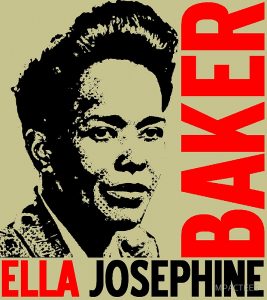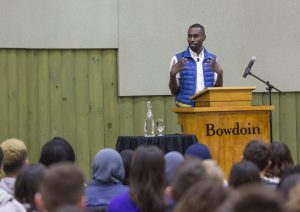What Have I Learned?
As a recently out nonbinary person, I was excited to take on this project in order to learn more about an issue of importance to me while also having the opportunity to reflect on my own experience. In this section of the website, I will share some of those reflections and takeaways.

Redbubble
Takeaway I: The Power of Ella Baker’s Model
One of the biggest takeaways for me in completing this website is the continued legacy and effectiveness of Ella Baker’s model of organizing. I was shocked when we began this course that I had never learned about Baker before. It was when I read this quote — “On what basis do you seek to organize people? Do you start to try to organize them on the fact of what you think, or what they are first interested in? You start where the people are” (Mueller, 2004 84) — that I began to deeply resonate with Baker’s vision of community organizing as a pursuit of shared liberation.
Baker’s legacy was widely evident as I researched organizing for transgender youth in urban education. Specifically, two of the grassroots organizations that I researched contain clear connections to Baker and her work. Both BAGLY and Portland Outright are intersectional coalitions of queer and trans youth that organize off of Baker’s principles. BAGLY and Outright are both led by and for the people they serve–their leadership model includes community members that know the distinct needs of their group, and thus they are able to “start where the people are.” For example, the Outright mission statement says, “We are committed to moving beyond the traditional LGBTQ+ youth ‘support group’ model by carving out space for young people in leadership, lifting up the experiences of those most deeply experiencing the effects of marginalization, helping our members harness and reclaim their inherent power, and becoming active participants in not only our own liberation, but the collective liberation of our friends, neighbors, and allies” (Portland Outright). Baker believed in providing individuals with the guidance to find their own way as a community. Outright, in its efforts to “carve out space for young people in leadership” and “help members harness and reclaim their inherent power,” is doing exactly that, and making lasting change for the Portland trans community in the process.

Bowdoin News
Takeaway II: The Power of Stories
In his talk at Bowdoin College in December 2017, Black Lives Matter activist and civil rights leader Deray McKesson explained, “In this moment, the role of storytelling has never been more important. Ideas travel in stories.”
The power of sharing one’s stories was evident while researching trans rights in urban public schools. For example, in 2017 the Transgender Education Network of Texas fought the state’s discriminatory anti-trans bathroom bill by collecting the testimonies of trans, intersex, and gender-non-conforming Texans, and then reading them at the Senate Committee on State Affairs. The bill, which would have prohibited trans youth from using the correct bathroom in school, ultimately failed. The ability for youth to fight this discriminatory legislation through authentically voicing their own experiences speaks to the power of storytelling. This is a takeaway from this project that I will continue to hold close to my heart.
Sharing My Own Story
In this vein, it felt pertinent to close this website with some personal reflections on my own experience as someone who is recently out as nonbinary, but identified as a cisgender girl/woman for the duration of my K-12 schooling.
When I was in high school, my good friend Chris came out as a trans guy. He was, to my knowledge, the first out trans person to have ever attended our school. We went to a preparatory boarding school in suburban New Jersey; it was rife with privilege, classism, racism, gender discrimination, and trans/homophobia. When Chris tried to advocate for the creation of gender-inclusive single-stall bathrooms, he was met with major pushback from other students. A boy in the year below us ran for Student Body President by stating that trans-inclusive bathrooms were absurd and inappropriate, and men and women should be “separate but equal.” He received no punishment.
For the sake of the word count of this reflection, I will not unpack the innumerable layers of racism, sexism, and transphobia imbued in this student’s comment. I will say, however, that in high school, even though I had this nagging, gnawing feeling that something wasn’t right when people called me a girl, and even though I spent hours watch videos of trans people on youtube, the discrimination and marginalization playing out at my school prevented me from even entertaining the idea that I was a nonbinary transgender person.
But once I came to Bowdoin, I found a community that, despite not being perfect, had a network of out trans people, and numerous gender-inclusive bathrooms, and resources galore to aid me in the process of finding myself. I’m graduating knowing full well that Bowdoin’s efforts to be thoughtful and inclusive surrounding trans identity are part of the reason that I can be more open about my identity today.
For me, completing this project and reflecting on my own experience is a testament to the need for inclusive school communities that allow trans student to find themselves and thrive in their identities.
